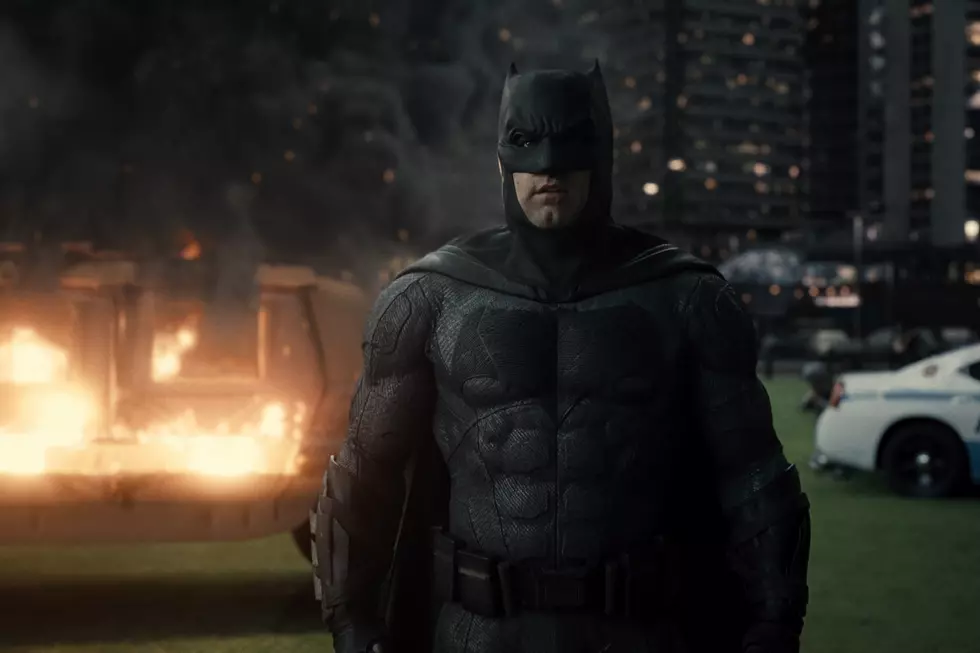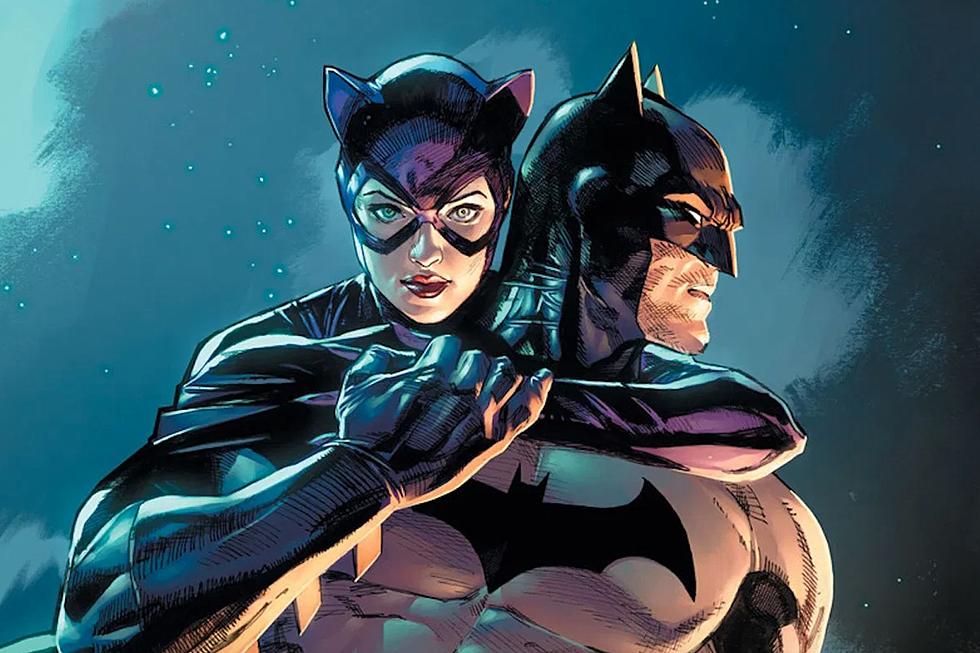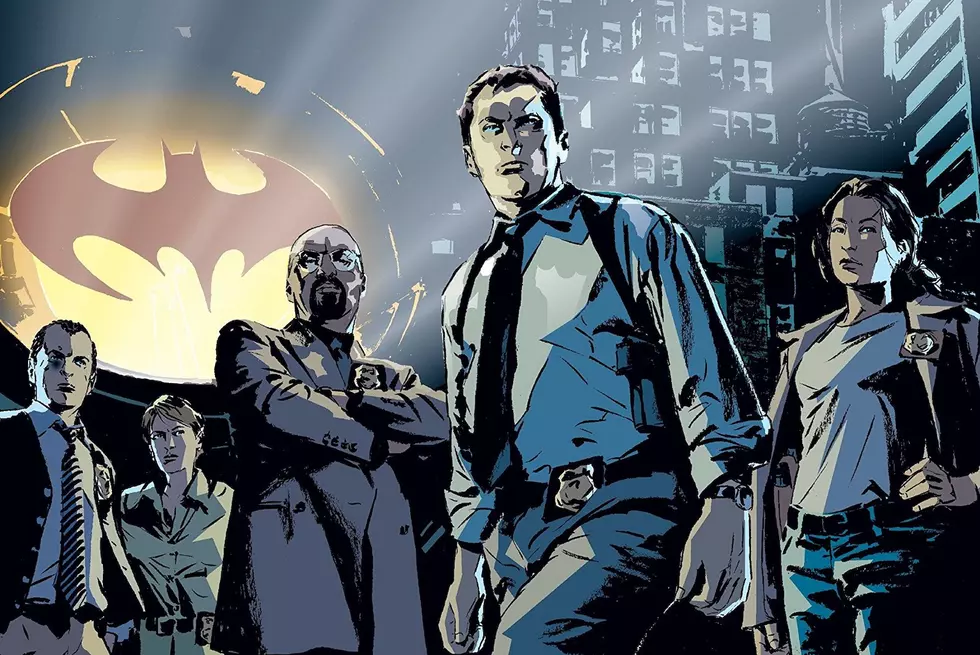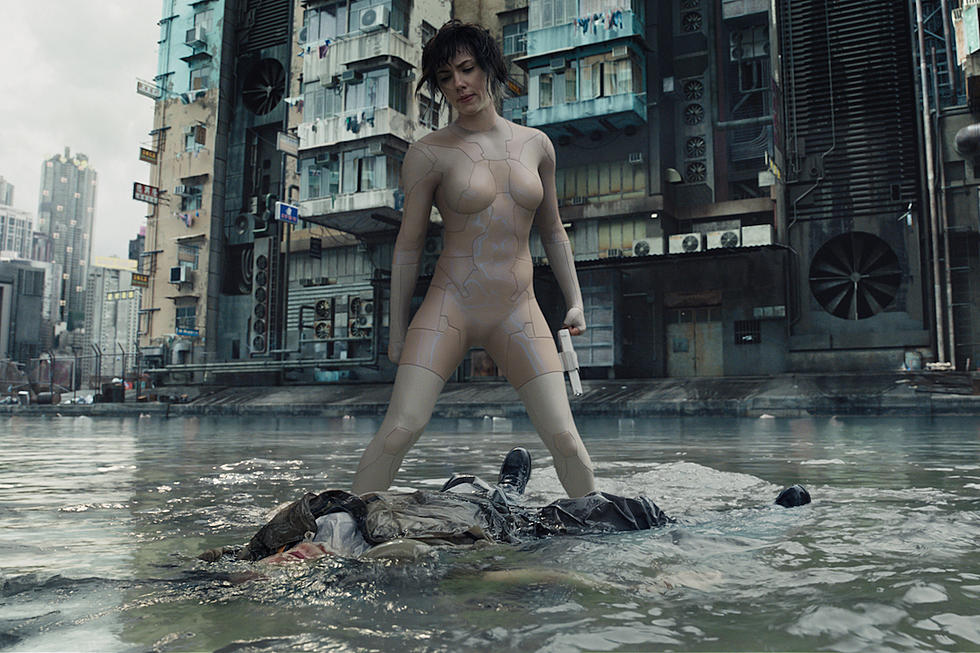
ComicsAlliance Reviews ‘The Dark Knight’ (2008), Part One
Each week, Chris Sims and David Uzumeri take a look back at one of the most successful and influential comic book movie franchises of all time, in ComicsAlliance's in-depth retrospective on the Batman films.

David: So we're here to discuss this little-known movie called The Dark Knight.
Chris: That's right, everyone: After twenty years of filmmaking condensed into the past few months, Cinematic Batmanology has finally reached the most recent Batman film: 2008's The Dark Knight, directed by Christopher Nolan and starring Christian Bale, Heath Ledger and Aaron Eckhart. And to mark the occasion, we even have a special guest: ComicsAlliance Editor Andy Khouri.
Andy: To quote The Joker, "Hi..."
David: It's a two-and-a-half hour crime drama that's a meditation on the public's relationship with elected officials, the necessity of inspiration and heroism to lift up a beleaguered people, the fallacy of pessimism, trading freedom for security and sacrificing your own image for the good of the people. In short, it's about how sometimes you have to lie. Incidentally, it also has Batman, the Joker and Two-Face in it.
Andy: Because I'm a comics journalist with insights of great worth, I was privileged to visit the Chicago set of The Dark Knight during production. I got to see and hear quite a lot, including conversations with the principals, and I'm happy Chris and David have included me in this commentary as The Dark Knight is one of my all time favorite films.
David: I don't think any of our readers are going to be surprised when I say that The Dark Knight is a really, really, really goddamn good movie. It improves on Batman Begins in almost every single way. It fixes almost every problem the previous film had, and then it soars above all of that. There is not a single aspect of this movie that is not A-grade. Nolan's directing, Wally Pfister's cinematography, the fantastic Hans Zimmer score, Christian Bale, Maggie Gyllenhaal, Morgan Freeman, Michael Caine, and especially -- especially -- Heath Ledger and Aaron Eckhart, who are absolutely off the freaking charts.
Andy: Don't leave out James Newton Howard, who wrote half of the score, specifically Harvey's material.
David: I did not know that.
Andy: It's cool I know this isn't one of your favorite movies or anything.
David: This is why we've got you around, film connoisseur!
Andy: Howard also worked on Batman Begins, but the familiar themes and brilliant BAM BAM sounds in the music are Zimmer's.
Chris: Yeah, in the least surprising turn of events of all time, The Dark Knight is one of my favorite movies ever as well. It's hard to put into words, but it's like... Even Batman Begins still had weird over-the-top sci-fi comic book stuff in it like the Microwave Emitter, but this is like an actual film. You know, for grown-ups.
Andy: Indeed, some grown-ups report their young children are bored by it.
David: Screw those kids. If they can't take the heat, they should get out of the kitchen.
Chris: Don't get me wrong, I think our column about Batman and Robin will show that I have a pretty deep love of crazy over-the-top comic book stuff in movies, but this one... It's one of the few absolutely serious takes on the character that really works, and uses all the themes going on with these characters and what they represent to tell a complex, mature story. And I mean "mature" with its actual meaning, not the one you usually see in pop culture, which is "naked girls, blood and cussing."
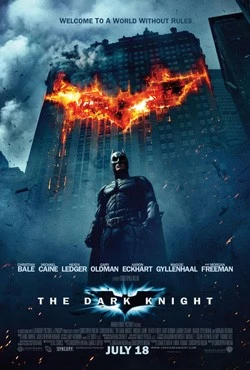 Andy: The Dark Knight is a film with something to say about something, which we will get into as we proceed. But it is also about Batman. It's impossible to identify a seam in the film, where Nolan maps ideas and themes onto Batman and his world or where Batman and his world inspire those themes and ideas.
Andy: The Dark Knight is a film with something to say about something, which we will get into as we proceed. But it is also about Batman. It's impossible to identify a seam in the film, where Nolan maps ideas and themes onto Batman and his world or where Batman and his world inspire those themes and ideas.
David: The thing is that this movie is unmistakably the production of a very, very, very tight team. How many movies had Nolan, Zimmer and Pfister worked on by this point? Begins and The Prestige, for sure.
Chris: That makes a pretty good segue into talking about the background of the film.
David: There's a reason this movie made way more money than Batman Begins, and that's that this was absolutely targeted, brutally, at the zeitgeist. This was the right movie at the right time.
Chris: It really was. Begins was, obviously, pretty successful, and apparently successful enough that they pretty much let Christopher Nolan do whatever the hell he wanted in the sequels, with the result being a movie that made over a billion dollars worldwide, about $800 million of which was pure profit. For those of you wondering, that's what it takes to get the studios to stop telling you that your Batman movie needs to have the word "Batman" in the title or people won't be able to figure out who it's about.
David: The buzz for this really started when Nolan started showing off the opening sequence as basically a standalone short film, which it sort of is, and it basically blew the mind of everyone who saw it.
Andy: Those screenings were part of 42 Entertainment's brilliant alternate reality game marketing apparatus, which I credit for getting a lot of people very interested in the film - not the least of whom were members of the comics press and, at least in my experience, loads of women who may not have otherwise been excited about another Batman movie. The Joker websites were hypnotic and sucked you in with the ever attractive scent of anarchy and rebellion. Events around the country saw costumed fans gathering at bakeries and pizza joints, running across busy streets looking for clues. I myself received a cake in the mail with a ringing cellphone inside it. It was fun.
By the time the film was ready to open, a whole generation of fans were endeared to the film and to the Joker in particular. I was seeing all kinds of Joker stuff at nightclubs and street art here in LA. To say nothing of the Gotham TV news websites, the Harvey Dent campaign websites, the Comic-Con game where people put themselves in clown makeup and sent them into the Joker's website.
David: This movie had maybe the best marketing campaign ever. Because there was nothing about The Dark Knight that wasn't handled brilliantly, even the advertising. The Dark Knight is an object lesson in why you don't listen to the fans, ignore the studios, and get out of the auteur's way.
Chris: Oh man, the fans. Working at a comic book store at the time, I can confirm that fan reaction in before this movie was released is absolutely hilarious in retrospect. And I'm not even going to lie, I was totally a part of it. I remember seeing that first shot of Ledger as the Joker and thinking it looked absolutely awful. I think it might've been the first time I made a joke about Batman taking on the Great Milenko in Shangri-La.

David: When this movie came out in 2008, I really was just breaking into writing about comics. Final Crisis and Batman R.I.P. had just kicked off, and I'd just started doing annotations. And man, I have to tell you, that year gave us two of the best renditions of the Joker of all time. There was seriously something floating through the ether, the Jungian unconscious, whatever, that Morrison and Nolan came up with incredibly similar takes on the character practically independently. I realize we're here to discuss the movie, but it's actually very difficult to separate it from the rest of the incredible Bat-material that hit that year. 2008 was THE watershed year for this character, between this, RIP and the debut of the Brave and the Bold television show.
Chris: It's true. But man, if you can find some message boards from 2007, you will see so, so many people making Brokeback Mountain jokes about casting Ledger as the Joker and whining about how this gay cowboy was going to screw things up so bad. These are, of course, the same people who would dress as Ledger's Joker for Halloween three years in a row, while also starting up new threads about how Anne Hathaway's not pretty enough to be Catwoman. It's a vicious cycle, y'all.
David: No, she's pretty, just not sexy enough, Chris! She played a princess once in a Disney movie, that means she's forever incapable of even attempting to be a femme fatale.
Chris: Twice. Princess Diaries had a sequel.
David: I realize we're gonna get guff in the comments about how the only gay cowboys here are us for being unable to get off this movie's jock, but seriously, I just can't hold back. This movie was a Big Deal. But to be honest, I'm getting super impatient to get into it. This movie's amazing, and this movie's long, and we can't just discuss action scenes as a whole, because every single element of this movie is important. There is not a single line of throwaway dialogue.
Andy: We could probably write all day about the bank heist alone.

Andy: A quick word about the opening animation. Like the bats in Batman Begins that put together his symbol, this flaming emblem establishes the tone and color scheme of this film: this is dark and blue/black, and it's on fire. Nolan tells us what we're in for.
David: So we kick off with the frankly virtuosic bank robbery sequence.
Chris: It's a pretty amazing heist, with this beautifully compact set-up and like five twists before it's all over, and it's the first six minutes of the movie.
David: The movie makes one thing completely clear from the get-go: the Joker is an absolute criminal genius, and we learn this from the point of view of his goons. The heist kicks off with two teams: the rooftop crew, which is two goons, and the three who enter in the front and do the entire "let's shoot AKs in the air and scare people" thing. Except that absolutely NONE of this is as it seems.
Chris: Not just a criminal genius, but a meticulous master planner.
David: We get this in the very beginning, when one of the two goons cuts the silent alarm from the rooftop (after using a grapple launcher to get there from an adjacent building), and not only does he comment (very importantly) that the silent alarm is going to a private number rather than 911, but then his compatriot caps him in the back of the head, on the orders of the Joker himself. The Joker claims to be all about chaos, but that's all bluster, and this opening sequence proves it: every single action he takes is brilliantly calculated. And credit to the Nolan brothers for being smart enough to write a villain this damn smart.

David: Out of the three goons who invade the front, one of them starts cracking the safe while another one intimidates the bankers and customers, while a third one just starts clipping grenades to people, completely silently.
Chris: It's the manipulation that sells it. He's able to manipulate these guys into killing each other -- presumably with the promise of a bigger cut of the take -- but at the end of the sequence, he's even able to position himself so that the last robber is actually standing in the right spot to get taken out by the schoolbus. So not only does he get all the money, but there's no one left to tell everyone how he plotted everything, instead of just being the raving, mass-murdering lunatic that he wants everyone to see him as. That's his disguise, as much as Batman is Bruce Wayne's.
David: Yeah, let's just get this out of the way: the silent goon is the Joker, and this entire heist is an elaborately constructed human Rube Goldberg machine made of social psychology and criminology rather than candles and bird cages. But here's the thing: every single plan the Joker makes here is predicated on the innate selfishness of human beings. And when you're dealing with four hired goons and the security force and managers of a mafia bank, that's a safe bet.
Andy: Right, he plays the systems: human self-interest, human rules and authority.
David: As we'll see as this movie goes on, the one thing the Joker absolutely cannot predict, and does not plan for, and doesn't understand, is altruism.
Chris: He and Lord Voldemort have so much to talk about, including their intense hatred of self-righteous orphans.
David: And man, the score during this sequence is amazing. The sense of building tension is perfect.
Andy: I have to tell you guys about this bank set. It's actually a building called The Old Chicago Post Office, and it is even more grand and impressive in person than it seems in the film. The amount of detail they built into it was incredible. Around the set you could see things that would never appear on screen. There are automatic teller machines whose screens display the name of the bank and its logo, there were brochures and deposit slips with the same. The building was built in 1921, and I can tell you the giant hole in the wall was real.
David: Is there a single CGI shot in this movie, other than later on with Batman's... well, insecurity system?
Andy: I think there might be one or two brief Batpod CG shots, and perhaps Batman gliding
David: When Bozo is the last clown standing (thanks, subtitles), it's especially clear that something's wrong, especially when the bank manager starts yelling at him about how he's just gonna get capped by his boss like the others. He doesn't have any idea who he's dealing with. After everyone's dead, the Joker reveals himself to the mob boss, who just doesn't understand the concept of criminal anarchy. He goes on about honor and respect, tenets of omerta that just don't apply to the Joker. Apparently the Joker is a big Pearl Jam fan, because he has no code.
Andy: The power of the bank heist scene is also enhanced by Nolan's prodigious use of the IMAX format. Nolan is a classic filmmaker in the sense that he loves big, beautiful, high fidelity images, and the IMAX format is that kind of filmmaker's best friend. He's aware that you are going to see this film on a big screen, and he wants to fill that screen with as BIG and visually rich an image as he can, it's part of Nolan's mission to pull you into the world of this film and believe in it utterly.
David: That's absolutely true, the use of the IMAX format for this scene is essential. It's an experience that absolutely can't be replicated on Blu-Ray, and it's a shame that they had to cut off portions of it. I'd almost prefer they black-barred the sides so we could see the full IMAX frame. The IMAX is not a gimmick in Dark Knight, it's the director's preferred vision.
It's also important to note that this isn't a movie that would work in 3D. The resolution might be expansive, but Nolan uses classic focus techniques that you can't pull off in that format. People forget that 3D actually takes tools out of the stylistic toolbox. This isn't about immersing you in the world, it's about immersing you in his vision.
Andy: I spoke to Nolan about 3D. This is what he had to say:
"I've never been particularly interested in 3-D because to me, one of the things that's just amazing, one of the things I'm trying to get back, what I love about movies is their larger than life quality. And it's a peculier thing, the way our eyes work, that when you wear 3-D glasses to look at a 3-D image, the screen appears to be smaller. When you take the glasses off, the screen seems massive again. I'm interested in that massive canvas, that larger than life canvas that IMAX gives you. It creates an immersive quality by the clarity of its imagery and size and brightness. That gives you a great visceral sense like you would get in a 3-D movie, but it doesn't diminish the scale of it.
I also hate wearing those glasses."
David: This isn't in the James Cameron tradition, it's in the Michael Mann or Alfred Hitchcock tradition. I've never seen it -- I know, I'm the worst -- but the comparison I heard the most when this movie came out was to Mann's Heat.

David: So he puts a live grenade in the manager's mouth, holds on to the pin, and drives the bus off with it, basically so this manager, lying on the ground, shot, has to sit there and watch this bus drive off like a countdown to his own demise.
Chris: I love the look that the bank manager gives the Joker, and how -- again, as part of his meticulous plan -- the Joker totally lets that guy stay free until the end, letting people see who he's dealing with and what the differences are between the Old Crime of Gotham and the New Crime that's rising in response to Batman. Old Crime doesn't have a chance.
Andy: I think the key exchange here is the mob banker asking "What do you believe in?" He is profoundly offended by what's happened, it's like a religious war happening in this bank. He cannot believe what he's seeing. The Joker defies his most sacred beliefs. Beyond being brilliant, the Joker is brazen. He's attacking a mob bank the way a kid would shake an antfarm. I don't think the exchange with the mob banker could be any more powerful. It is a religious moment. It is first blood in a religious crusade. "What do you believe in?" is a question that comes up throughout the film.
David: The Joker drives off, blending in perfectly with a passing convoy of school buses (again, that meticulous planning), and then the grenade goes off, and it's just gas. In an open space. It's harmless. To show the manager that the Joker is unpredictable, and also because the manager being alive to send a message to the mob about who the culprit was is a crucial step in the Joker's plan. As a matter of fact, it's THE crucial step, because this heist wasn't performed for the money, it was performed purely to send a message.

Chris: We do need to move on, but seriously, the economy and power of the heist cannot be overstated. We're six minutes into the movie, and we have everything laid out for us: New Crime versus Old Crime, "Who do you believe in?", the Joker as a master planner who is able to manipulate the system to his advantage through meticulous planning, and who doesn't feel any loyalty at all to anyone else. If this wasn't a Batman movie, it'd be a Diabolik movie.
Andy: The last thing I'd say about the bank heist is that it is the first of many instances where Nolan introduces something that we'll call "reality" and presents the Joker, and everything he represents, undermining it. I think it's important because as David said before, Nolan is aiming this film directly into the zeitgeist.
David: That's the other important thing: the bank heist is a perfect microcosm of the entire film.
Chris: It's also a good example of the old saw of the Villain being easy to identify with because it's his act that puts the plan into motion. In Begins, that was lessened by the focus on Falcone and the Gotham Mobsters -- Batman's presence was what put them on the defensive. Here, as we've seen, the Joker is running circles around everyone, even Batman.
Andy: The causality mechanism you guys discussed in Batman Begins is in full effect here as well, but maybe we're getting ahead of ourselves.
David: It's fascinating that Begins ends, and this movie begins, with that short-sequence microcosm of the entire plot. We get the escalation, and more than anything, we get the shifting of blame -- or actually an inversion thereof. The Joker wants all the credit for this, something he did, while Batman takes credit for things he had absolutely nothing to do with out of an altruistic motivation, again, something the Joker just can't understand. But we'll get to that.

David: In the next sequence we're introduced to not only Mayor Bat-Manuel, but also Commissioner Gordon (played incredibly well by Gary Oldman) and Detective Anna Ramirez, a character whose existence was met with surprise, since she was so similar to Detective Montoya from the comics. As a matter of fact, in the Gotham Knights animated feature that acted as a prelude to this movie, she even went on a Greg Rucka-written case with Crispus Allen, Montoya's partner.
Andy: She was on set the day I was there, and the other reporters and I were obviously very excited to see that Renee Montoya would be in the film. When asked, Nola stated emphatically that she was not Renee Montoya. Why? He said, "We did look at using her but we wanted to change the character from the way she is in the comics, so we changed the name of the character." Can you believe it? A comic book filmmaker changing the name of a character rather than screw that character up? Nolan also did this with Detective Flass in Batman Begins, who is very close to Harvey Bullock in most respects.
"That's part of our process, we look at the demands of our story, based on our reading of various comics we're being influenced by and everything, and as the story starts to shape itself, there's a certain sense in which you decide which characters you're [accurately] representing and which have changed a bit and therefore need to be our own characters."
Chris: And like Flass, Ramirez turns out to be corrupt later, which makes her a nice double-blind for comic book fans. In the same way that Liam Neeson's mustache should've tipped us off in Batman Begins, the fact that Ramirez isn't Montoya is, in retrospect, a pretty big clue to what her deal turns out to be.
Andy: Because we are just so used to comic book movies making arbitrary changes to characters and stories, we forget for moments that Nolan must have had a reason for not calling her "Renee Montoya."
David: That's very interesting about Flass, actually, because his appearance IS very much like Bullock, as opposed to the special forces looking dude that Flass was in Year One. Gordon also mentions that Ramirez's mother is in the hospital, an important clue to her later turn. Because if there's one thing this movie does, it's play fair -- almost too fair.
She asks Gordon if Batman's coming because the Bat-Signal's on, and he points out he doesn't come often, hopefully because he's actually out fighting crime. We then cut to a drug deal between the mob and the Scarecrow, still played by Cillian Murphy, who's now a total cut-rate drug dealer rather than the scourge of Gotham he was in the last movie. He's practically castrated without the backing of Ra's al Ghul.
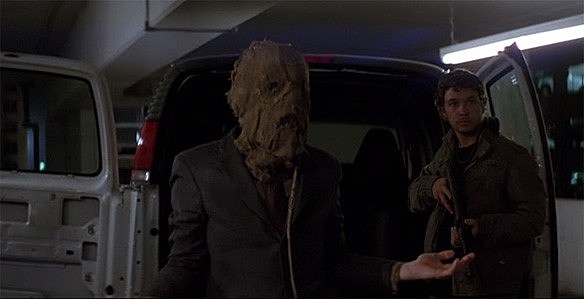
Chris: He's also full-on crazy as a result of being dosed with his own gas.
David: The Chechen mob leader points out that Scarecrow fear gas makes for a remarkably terrible recreational drug, since basically nobody ever wants to do it more than once.
Andy: I love that Crane has embraced his inner douchebag. "I didn't SAY they wouldn't freak out and die!"
Chris: Another big Miller reference. I remember coming out of the theater and one of my friends was absolutely flipping out that he had seen a movie with the Sons of the Bat.
Andy: In the Nolanverse they're called Citizens for Batman, and they also sent me some stuff in the mail, including a Batman mask. In the alternate reality game, they operate under the "civil disobedience" banner, which is what they perceive the Batman as doing.
David: They get interrupted by the Batman Impersonators, who are a bunch of dudes in crappy Batman masks with shotguns and machineguns. Scarecrow immediately recognizes that they can't be the real Batman, which is true, because then the Tumbler crashes through the side of the parking garage in the hilariously named "Loiter" mode. It then switches to "Indimidate" mode, and -- honestly, this sequence is overall pretty funny. Nolan's very, very good at the dry wit in this. He understands the power of a single understated seemingly out-of-place element in a serious flick, and how it can be used for comedy that doesn't undercut the rest. It also eases the tension, because if this movie kept that up for two and a half hours, people probably would have had heart attacks.
Andy: One thing I love about the Gordon/Ramirez/Crane/Chechen sequence: Batman's Plan is working.
Chris: Right! Batman's entire stated goal in Begins is that he wants the people in Gotham to not be afraid of the criminals, and have something to hope for that will allow them to not let themselves get pushed around anymore. And it totally works, both with the rise of the Citizens For Batman and with the fact that crooks just cold stop doing crimes when they see the signal.
David: And it would have continued to, if not for the unforeseen ascendance of his opposite on the side of crime. Batman is to the police as the Joker is to the mafia. They both completely and irreperably break the old systems on both sides of the law, they both attempt to ally, and they both break that alliance by the end of the film. The thing is, Batman's optimism in people backfires on him almost as much as the Joker's pessimism backfires on him. He wants to inspire people to fight back, but instead he just incites the existence of a bunch of dangerous vigilantes who shoot firearms in public. There are basically three characters in this movie who live up to Batman's expectations of them: James Gordon, Rachel Dawes and the head prisoner on the boat near the end of the film. Everybody else lets him down.
Chris: Before we leave the Scarecrow and the Citizens, there's a moment that I think is pretty important. The part where the Citizens ask Batman why he doesn't want them doing the same thing he's doing, and what makes Bruce Wayne so special.

Chris: His response is "I'm not wearing hockey pads," which is one of the funnier lines in the movie -- and one of the few actual quips that Batman himself drops -- but I think it's fair to say that there's a deeper meaning there. We talked about the question of privilege when we reviewed Batman Begins, that Bruce Wayne is this guy with a phenomenal amount of money and social status and how that plays in, and this really addresses it. But I don't think this is meant to be just that Batman can afford bulletproof armor and a prototype tank and these guys can't, I think it's also a matter of dedication, commitment and methodology.
Andy: Right. I think the joke is for our benefit. We've just seen a whole movie explaining why Bruce is the only person who can do this. The Citizens wearing consumer sports equipment is a very stark example of why.
Chris: Also, presumably these guys have jobs and families that they go back to when they're not out being Batman. For Batman, this is all there is -- it's not that they don't want to help, it's that they don't want to give up their entire lives to do so, while he does. And also that they're out there with rifles. But at the same time, you see that Batman at least acknowledges that their hearts are in the right place -- "Don't let me see you out here again" isn't Grim Avenger of the Night, it's Friendly Local Sheriff.
David: After Batman busts up both the Scarecrow and the concerned citizens in a pretty cool action sequence (like all of the action sequences in this flick), we cut to Ramirez and Gordon in the vault the Joker robbed, as Gordon points out (with the help of a recently-arrived Batman and his Bat-Geiger-Counter) that the irradiated bills his detectives have been using to buy drugs found their way into the mob's vault, basically proving that they're the source of Gotham's dope.
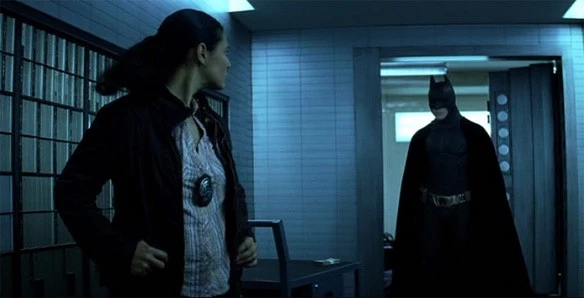
Andy: The scene with Gordon and Batman in the vault was really fun to watch being filmed. There is a moment you don't see, where Batman tosses the irradiated bills to Gordon in the middle of their conversation. Oldman was unable to catch it. They tried again and again and it just became a huge joke to everyone on the set. We were watching on a closed-circuit TV in a press area nearby, and when the crew heard us laughing, it just made them laugh even more. Finally, Oldman caught the money only during his close-up, making the bit useless.
David: Batman makes his first fatal mistake in this movie, prioritizing the mob over "just one man." Batman brutally underestimates the Joker at this juncture, and doesn't recognize that he's his opposite. He's not self-reflective enough to realize that he's more dangerous than the police.
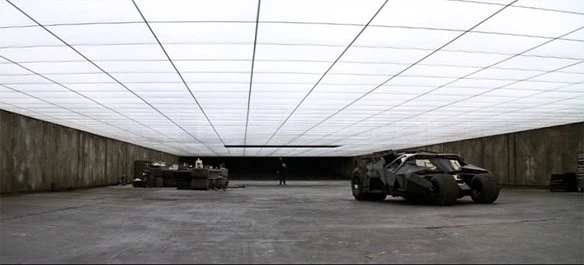
David: The next sequence shows Alfred walking into Bruce's bedroom in Wayne Tower, since the Mansion got blown up at the end of the last movie, and he isn't there. He finds Batman in the Bat-Bunker below Wayne Tower, which is accessed through a storage container in a warehouse parking lot, which is a pretty crappy excuse for a grandfather clock.
Chris: I like that set-up a lot, actually. It's hilarious to me that the only thing protecting the entrance to the Midtown Batcave is a padlock, because it's just hidden in plain sight -- although it's plain sight that a butler drives a Jaguar to, goes inside, and vanishes. But still!
Andy: These films fill me with anxiety over how many secret elevators might be hidden behind or underneath things.
Chris: We also get another big theme of the movie introduced here.
David: Which one would you say that is? Batman's need for self-improvement? Batman's distrust of Harvey Dent more because of Rachel Dawes than because of who he is? Or the fact that he's pushing himself beyond his limits?
Chris: Got it on the third. We see here how Batman's been literally taking a beating while improving the city -- a scene lifted as an homage to "The Autobiography of Bruce Wayne" from Brave and the Bold #197.

David: Alan Brennert is, no joke, probably the third or fourth greatest Batman writer of all time. And he wrote, like, two or three Batman stories. He's behind Bill Finger, Grant Morrison and Frank Miller. And maybe Denny O'Neil.
Chris: This leads to Alfred telling Bruce that he has to realize his own limitations, and Bruce responds with "Batman has no limitations," and says that even if he does, he can't afford to acknowledge them. And he's half right -- Batman has no limitations, but Bruce Wayne definitely does. His entire fall in this movie is built on exploiting Bruce Wayne, the man who believes in justice and is in love with Rachel Dawes, not the more-than-human symbol of Batman that gets dragged down at the end with him.
David: That's a great reading, and I actually hadn't thought of that. Which is funny, because the Joker doesn't know, and doesn't care, about the human Bruce Wayne behind Batman.
Chris: Right -- but from the moment in the interrogation that Batman says "Where's Rachel" and not "Where are Dawes and Dent," the Joker has a weapon he can use to ruin everyone.
David: That's a good point. Batman totally does tip the Joker off as to where his emotional tether is placed, and speaking of Rachel, we get to see her in the very next scene, where Harvey Dent is the most badass district attorney ever.
Andy: This is why the Rachel Dawes character is critical to Nolan's saga, and why she was recast with Maggie Gylenehalehnalanahal and not a new character altogether. I asked Nolan's wife and producer Emma Thomas about this, and that is what she said, that Rachel needs to be there. She is Bruce's anchor back to the real world. This Bruce Wayne isn't the obsessive psychotic of Frank Miller. He sees himself as doing what needs to be done but will be glad to retire when given the chance. However, Rachel, as she suggested in the finale of Batman Begins and reinforces with a major life choice later in The Dark Knight, thinks Bruce is kidding himself.
David: This movie wants to make you like Harvey Dent from minute one, and it succeeds.

Andy: People say Batman is the Joker's opposite, but in the Nolanverse, Harvey is the Joker's opposite. Like The Joker, Harvey is waging a jihad against the establishment. Everything he does is radical and meant to completely undermine the system for which he has nothing but contempt, just on the other side of the coin (heh). Harvey is the radical force of order, the Joker is the radical force of chaos. Batman is the grey, but to Gotham's peril, he wants to opt out.
David: We meet Dent as he's meeting Rachel in the courtroom and he flips a coin -- one longtime Batman fans and people who've seen the rest of this movie know is double-headed -- to decide whether or not he or Rachel takes the lead. Of course, since the game's rigged, he does. He's arranged for a mob member to tag Sal Maroni as the new head of the Falcone crime family in court, except that the mobster claims he's the mastermind, and Maroni's just the fall guy, to the amusement of most of the jurors. Then he pulls a gun on Dent and Dent grabs the gun, clocks him in the face, and makes a joke about the gun being from China and that if you want to kill a public servant, you should buy American. He's funny, he's brave, he's a social crusader and he's an immense crowdpleaser, both for the in-movie audience in the court and the actual audience sitting there in the theater.
Chris: It's another big trick on the Batman fans, too: You see Harvey Dent in a courtroom with a guy named Sal Maroni, and you immediately think "oh right, acid in the face, here we go." Instead, Harvey goes action hero on the guy, then demands that he still be questioned as a witness. It's a great subversion of expectations that allows Nolan to build Harvey as a character to give his fall a deeper meaning, something that was really only done in a similar way on Batman: The Animated Series.
David: And Eckhart, being like everyone else in this movie an incredible actor, sells it completely. We're also introduced to Maggie Gyllenhaal, who finally gives us a Rachel Dawes whose acting chops are on par with the rest of the cast.
Andy: Eckhart said he "read everything on Harvey" to prepare for the role.
David: And really, Rachel's a very different character here. Gone is the moralizing mouse of BEGINS, and instead we get the lively, sarcastic character she is here. It's way, way clearer why Bruce is in love with this girl, and Harvey too.
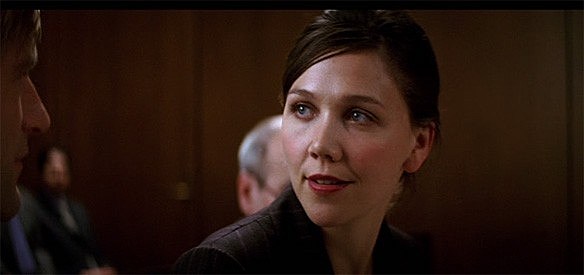
Chris: She's also totally stoked about the mob trying to kill Harvey because that means they're doing a good job -- something she herself has experience with, which makes her glee at the prospect even better. It makes me love Rachel, seriously.
David: Yeah, she doesn't freak out or get protective or anything, she's just proud of her dude and suggests that he like, take the rest of the day off and they go relax somewhere for a job well done pissing off crime.
Andy: The filmmakers reposition her here as a proper love interest and not a kind of estranged sister. Bruce desires her, she inspires him to get out the game. However, I don't think there's any chemistry between them. It's all on the page. All of Nolan's films are weirdly asexual like that.
David: I think that works, though. The lack of chemistry is exactly why Rachel isn't interested in him. As much as there's none between her and Bruce, there actually is some between her and Harvey, which is something, as you say, you don't see in Nolan flicks. I'm very curious to see how he ends up taking on Catwoman, because I have a feeling it's going to be pretty far from the Judd Winick SEXY SEX SEX SEX BANG BANG BOOBIES take he keeps harping on.
Andy: In Inception, Cobb is motivated by the idea of a woman and family he's lost, and so is Bruce. It's the idea they love, more than the actual woman.
Rachel's active prosecution of criminals also serves to undermine the damsel in distress cliche, as Nolan did in the first film. Rachel needs rescuing but only as a consequence of her proactive behavior. We know from the first film that Rachel is a deeply principled person who was inspired by Thomas Wayne. As she said, evil wins if the good people of Gotham do nothing. She believes in that and that is why she does what she does and that is why she loves Harvey. Maybe Bruce would have been Harvey if not for what happened to him.
Chris: I think you're spot on with that, Andy. I think Bruce knows that if Joe Chill hadn't killed his parents, he would've had this big love story, the billionaire heir and the good-hearted daughter of the maid, but that life was taken away from him. I wonder whether or not we're supposed to think that Rachel got into being a District Attorney because of her reaction to the Wayne murder. It's never discussed, but it's how I've always thought of it.
David: Yeah, there's a good man in there turned a little bit by anger. Which is a take on Batman that I'm usually not fond of, but Nolan makes it work. His Bruce Wayne isn't hyper-sane, he's irreparably damaged.
Andy: That's what Bruce wants to believe in, too. That's how he wants to live. In the light. But Rachel's got his number.
Chris: There's definitely that thread there. The idea that Harvey is what Bruce could have been if he'd been more principled than angry. Harvey isn't the kind of guy who would shoot Joe Chill at the courthouse, but he turns into one.
David: At the same time, there was always that fear in Bruce. Going back to the theme of the first movie -- weaponized fear -- it doesn't work on Harvey because he is completely fearless. If you blinded this dude he'd be Daredevil.
Chris: Which brings us to Dent's meeting with Gordon, which I love. The tension between the two is so perfectly set up, because Dent believes himself to be a stronger man, morally speaking, than Gordon. In Begins, we see that before Batman's arrival, Gordon sees his situation as helpless -- he watches Flass take money and tells him he won't rat him out because there's no one to rat him out to. He'd have a bullet in his head and be dredged out of the river within a week. But for Dent, there would be no question. He would've gotten out of the car, slapped the money out of Flass's hand, decked him with one punch, tipped his hat, flashed a winning smile and probably rescued a kitten from a tree. Or at least, that's what he thinks he'd do -- You get the feeling that for all his conviction and bravado, Dent hasn't been in that situation, he hasn't had the misery that Gordon has or the tragedy that Batman goes through. So when he does, it thoroughly breaks him. Gordon and Batman are the stronger men because they can adapt, while Dent's rigid, uncompromising philosophy is his downfall.
David: That's a great take, actually. I can't disagree with that.
Andy: Gordon says it right there in the scene, he earns nothing by being an idealist like Dent, whose idealism helps his career because it is in direct contact with the public. Gordon is in the sh** and he has to do the best he can.
Chris: The tension isn't that Dent thinks Gordon (and by extension, Batman) is working with the mob, it's that he thinks Gordon is operating outside the letter of the law -- which he is. And he can't abide that. There's no room in his philosophy, and there's no room for his philosophy in Gotham. Gotham destroys him.
David: Because the world is better off with a Gordon who's willing to work with dicks and try to make whatever difference he can in the longterm than someone who makes a short-term splash and implodes.
Andy: The acting sells it. Look at Dent's face when Gordon says "I can't score political points." He's got Dent dead to rights.
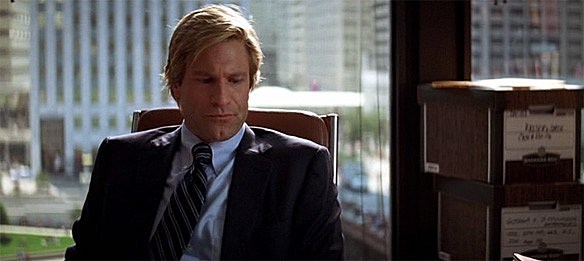
Chris: It's a phenomenal scene. Like you said, we like Dent -- he's the badass crusader. But we also like Gordon, who's the one good man doing what he can in a terrible situation. So the movie gives us these two ideas, and lets us see which ones play out. If you'll recall, Gordon survives this movie through the use of a massive lie, even to his wife, while the moment Dent tells a lie, even to save someone else, he's done.
David: Gordon's never going to be a minor celebrity. It all goes back to the question of privilege.
Andy: At this point in the film, Nolan has positioned The Joker and Harvey Dent as the two extremes of chaos and order, with Batman and Gordon in the middle, each leaning slightly to one of the other two's ways of thinking. The privilege concept you two discussed is what really opened my eyes about Batman Begins. We talked just now about how given different circumstances, Bruce might have become Harvey. But under what circumstances would Harvey become Batman? I think The Dark Knight argues that even Harvey Dent couldn't be Batman.
David: Gordon doesn't have the privilege Dent has of being in the media spotlight and being beloved by the people. He's too stuck in the down and dirty of the operations. In a way, he's almost more like the Citizens for Batman.
Chris: It also has them built up as pragmatism and idealism. Dent and Rachel aren't really more or less devoted to Justice and What's Right than Batman and Gordon, but Gordon "does the best with what he has," and Batman uses the weapons of the criminals -- mostly fear -- against them. But at the same time, Dent wants in on Batman and Gordon's operation. Or, more accurately, he wants them in on his operation.
Andy: I think by the end of the film, even pragmatism is positioned as a slippery slope to doom.
Chris: I think that in the end of the movie, you see that you have to temper pragmatism with idealism. Batman has his massive civil rights-violating sonar phones, but he leaves it up to the idealist, Lucius Fox, to determine whether to keep them. And he knows he'll do it, because he has good men and women to keep him in check.
David: Everyone's in a different situation with a different set of privileges that everyone else wants. Gordon wants Dent's political cache. Dent wants Gordon's relationship with Batman. Batman wants Dent's girl. The grass is always greener on the other side for every character in this movie. The only characters in this movie who don't want to be someone else are the Joker and Rachel. And so, while they all work together, I think Gordon, Batman and Dent all, to varying degrees, secretly resent each other.
Andy: They're like an infinitely falling set of dominos. Each one can make an argument that he's reacting to the other.
David: The Joker sees these fractures and exploits them brilliantly. He places a very deliberate, very precise set of emotional and mental bombs that completely destroy what could have been the best collaborative crimefighting force in American history. Well, Gotham's history.
Andy: He trolls them so hard yo.
David: The next scene introduces us to two new important characters: Mr. Lau, the Chinese banker who wants to form a partnership with Wayne Enterprises, and Mr. Reese, a Wayne accountant who's embarrassed by Bruce's insistence on both sitting in on, and sleeping through, important business meetings.
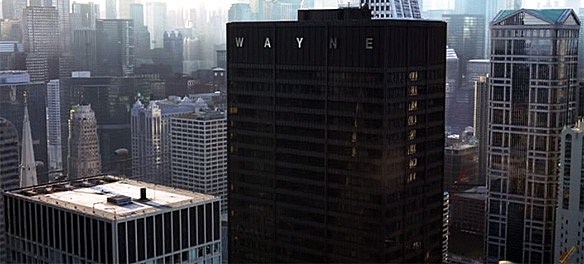
Andy: I love that the new Wayne building is an obsidian monolith in the middle of Gotham City, reflecting Bruce's true self.
Chris: This is basically the setup for a completely different Batman movie, which is another one of the things I love about The Dark Knight. In a lot of ways, it feels like a good run of comics. There are different stories at play that create this one overarching theme.
David: Reese, of course, assumes that Wayne is just a drunk partyboy who's sleeping off a hangover, and Lucius Fox runs interference, asking him to "run the numbers again" -- a request that will backfire on both him and Wayne.
Andy: For some reason they made the distinction that Reese is a freelance consultant. I'm not sure why. Why not just make him a staffer?
David: I guess to take away any company loyalty when he discovers what he discovers. As a freelance consultant, he has zero loyalty to Bruce himself or Wayne Enterprises.
Andy: But Reese's function is clear, he speaks to the audience's suspension of disbelief with respect to everything we've seen so far. What is up with all the Wayne money being spent downstairs? And why is Wayne dealing with this dubious businessman whose company has conspicuously steady growth every year? There was a brilliantly elaborate fan theory that Coleman Reese was the Riddler, but I can't remember how it goes.
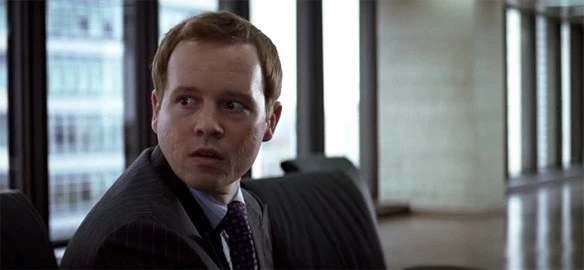
Chris: Mr. Reese. Mysteries. Riddler.
Andy: There was more to it than that, it went into the comics somehow. Anyway, it's very remarkable how much he looks like Bret Easton Ellis. I enjoy seeing Bret Easton Ellis tremble in terror in the face of Batman.
David: Yeah. Lau's company has had steady eight percent growth every single year, which basically anyone who's ever worked in the corporate world will tell you is impossible. Steady profits every year, maybe, but certainly not the EXACT SAME growth.
Chris: I love how Fox breaks the news that Lau's up to something illegal to Bruce and then realizes that he already knew, which leads to the realization that Batman is using his corporate resources to fight crime, too. This guy does not let up.
David: Lau's books are too perfect, and it's sloppy, and it tops off both Bruce and Lucius that this guy's totally illegal. Which is great, since the deal was proposed by Bruce in the first place, all so that he could get a closer look at their books. Which makes perfect sense, and also shows that we're starting to get a little Darknight Detective with our Caped Crusader.
Andy: Correct. That Bruce lured Lau's books into the open demonstrates an important difference between this Batman and that of the first film, and it's something I asked Nolan about in our interview.
Christopher Nolan: Yes. He definitely, much more easily in this story, assumes more of a detective role. That was something that was important to us to get in ["Batman Begins"]. We got it in a small way, but in dealing with the origin and dealing with all the larger aspects of the character, it became very difficult to get that in. We're trying to get in stuff we couldn't get into the first film, and the detective stuff is definitely one of those aspects.
David: I love the relationship between Lucius and Bruce. Lucius is the only person smart enough to see past Bruce's mask to the real guy, possibly because Lucius was so close to Thomas. The idea that Thomas and Martha, his two good friends, raised a completely selfish asshole is something that never even occurs to him. Of COURSE it's part of a ruse.
Andy: I think Fox is just smart like a fox, and knows a bullsh**ter when he sees one. "Spelunking my balls."
Chris: Well to be fair, Thomas and Martha didn't get to do much raising.
David: I disagree. They raised him up to an appropriate age, enough to instill a very frankly socialist value set. And on top of that, much like Bruce says in Year One, the most valuable part of the inheritance from his parents is their friends.
Chris: I think you're just a bigot who defines "family" as being between a man, a woman and a child and not a vigilante and his butler, David.
David: And on top of that, much like Bruce says in Year One, the most valuable part of the inheritance from his parents is their friends. There may not be a Robin, but Nolan's Batman is far from a one-man operation. And Alfred and Lucius are not only indispensable but also largely his allies because of their friendship with his parents.

David: Now, the dinner scene is the official introduction of Bruce Wayne to Harvey Dent, and the two of them immediately start getting into a dick-size competition, basically.
Andy: I am disturbed, as I was with Superman Returns, with Batman's shocking contempt for the tennets of Bro Code. I find this creeping on other people's girlfriends to be incompatible with the superheroic ideal of justice. This isn't the f***ing X-Men.
Chris: Bruce finding out that Harvey has plans to take Rachel to the ballet and then totally using that information to f*** up their date later is maybe the best thing about this movie.
David: Harvey sits down with Rachel and starts bragging about how it took him three weeks to get a table and he had to use his connections, when Bruce shows up with a Russian ballerina and brags about how he owns the entire restaurant. But that's not the only layer going on, since the entire conversation consists of Bruce basically slamming Batman and Harvey defending him.
Andy: It's a test. As Bruce told Alfred earlier when they were watching Dent on television, Bruce is watching Harvey closely. We know it's because Bruce wants out the life.
David: Which is something Dent himself figured out. He compares Batman to the Roman consul, and when Rachel points out that the last consul basically established himself as ruler for life and started an empire, Dent drops what is unquestionably the movie's thesis statement: "You either die a hero or live long enough to see yourself become the villain."
Andy: It's also a nice callback to Ra's al Ghul, who just hated those Romans.
Chris: Natasha the Ballerina also voices the theory that Dent is "the Caped Crusader," which is a nice moment in the film that's also a vague callback to the minutiae of Batman: Year One. It's great, because to them, it makes sense, but as the audience who knows these people, we know that working outside the law would be anathema to Dent himself. Although he definitely has the chin for it.
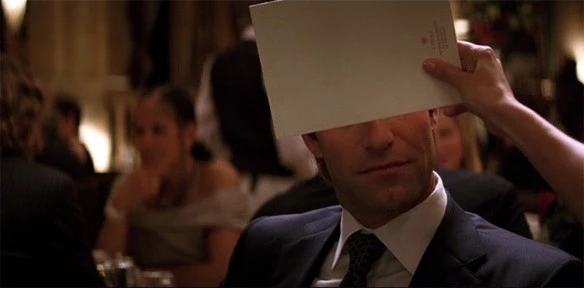
David: Bruce basically sets Dent up to defend Batman, and discovers that with regards to the future of the concept, he and Dent are on EXACTLY the same page. Bruce sees himself as a jumper cable for the engine of Gotham City's safety. He doesn't want to be the carburetor. He KNOWS he can do a lot of good as just Bruce Wayne, billionaire philanthropist. He is totally okay with that life. He wants to be Batman as long as Gotham needs Batman, but he doesn't at all want to be needed. Which is interesting, because for all of his darkness, Nolan's Batman is not obsessed.
Andy: But remember, David, Rachel disagrees with you.
Chris: And so do I.
Andy: She said it at the end of film 1, and she says it at a crucial stage of this film. There's the question of Gotham needing Batman and the question of Bruce needing Batman. Rachel decides that Bruce does need Batman.
Chris: Maybe Bruce THINKS that he's only there to turn things around, but it's more likely that he just hasn't accepted it yet. This is who he is now. There will always be a Batman in Gotham City, he just doesn't want to admit that because it means not being with Rachel.
David: That's an excellent point.
Andy: Bruce's conviction to quit is put to the test later and he fails. I think Rachel is right. But at the moment, Bruce's plan is to pass the mantle to Harvey along the lines you described.
David: I'd never really thought about the fact that, in a sense, this movie is about addiction as well.
Chris: I also like that while he does it in typical bragging playboy Bruce Wayne "oh dude I am so rich you don't even know" style, Bruce reveals his actual support for Harvey in this scene -- something Rachel actually misses later, not realizing that Bruce likes Harvey the guy, just not that he's Rachel's boyfriend.
Andy: Harvey passes the test, so Bruce's plan advances apace.
Chris: There's a great logic to his plan: If he can't be with Rachel because he's busy saving Gotham, then when Dent becomes busy saving Gotham, Dent won't be able to be with Rachel either, so he'll have his chance. It's kind of a simplistic view, an understanding of relationships that a child would have that doesn't take into account that Rachel actually loves Harvey for who he is and what he does. But it's perfectly in keeping with a guy who sees the world in a way that allows him to forge himself into a symbol of justice to singlehandedly end crime.
David: In a kitchen in which I can only assume is an Italian restaurant, we see a mob meeting where Mr. Lau -- whose illegal activities we just saw Bruce suspecting when talking to Lucius -- communicates with them via a crappy old CRT TV that I'd think the mob could afford better than.
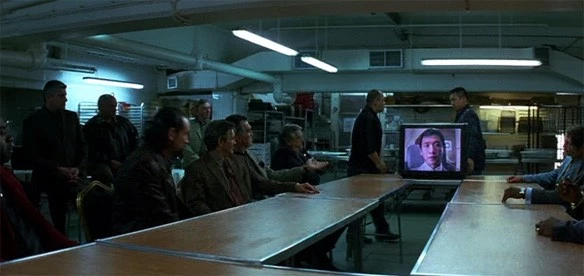
Chris: Maybe that's an indication of how hard Batman and Gordon have been hitting their finances.
David: But they haven't been -- Lau points out that it's a "relatively small amount," $68 million. Maroni's informants in Major Crimes -- who we'll find later -- have tipped off the mob to the fact that their bills were marked by Gordon and Batman, and this leads to Lau's suggestion that the mob give him all their money for safekeeping since Gordon plans on raiding all the mob banks that day.
Chris: Lau's entire reasoning for this is that the money will be out of Dent's jurisdiction, which again is an Old Crime way of thinking that doesn't account for the fact that the Batman will totally follow you to China, beat you down, and escape by dangling by a rope from a passing jet. Although to be honest, it's hard to blame them for not thinking of that possibility.
David: The idea of limits comes back here -- not just Batman's, but Dent's. Remember that line from the last scene in the restaurant when Bruce pointed out that Dent should know the borders of his own jurisdiction? When Dent jokes about Wayne Manor not being in city limits? As much as Batman recognizes that he doesn't have limits himself, he thinks that Dent doesn't know his own. Lau's taken the initiative of grabbing the cash already, completely screwing over Gordon's seizures. And at this point, the Joker enters.
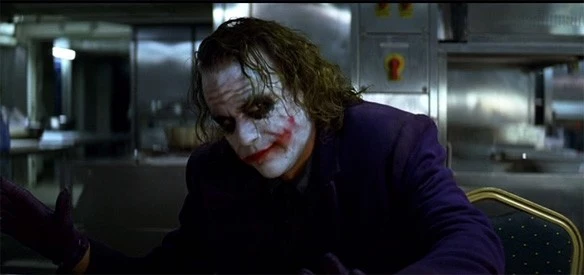
Chris: I cannot say enough good things about this scene. It's incredible, and Ledger pulls off the idea that the Joker's both hilariously funny and terrifyingly sinister all at the same time so well. The pencil scene, the line about how his suit's not cheap -- "you ought to know, you bought it." -- the fact that he points out how their plan is needlessly complex when all they really need to do is "Kill the Batman." It's perfect.
David: The Joker shows up and, as he does in a lot of the movie, immediately calls everything that's going to happen. He points out that Batman has no jurisdiction and is going to find Lau and make him squeal, which is exactly what happens. He points out that the mobsters used to run the town and now that Batman's around, people like Dent are showing up and totally ruining their empire. He shows up and speaks truth to power.
Andy: The whole scene is a stunning demonstration of the Joker's breathtaking reinvention of the status quo. He shows up at this important event uninvited, alone, looking the way he does, murdering someone at the drop of a pencil, telling truth to power, making demands for half their worth, and ready to blow them all to hell if they try anything.
David: His solution: kill Batman. Everyone laughs, and he basically shows that he's wired with plastic explosives and a dead man's trigger.
Andy: Ledger borrows a trick from Christopher Walken in these performances, which is to speak in two voices. He's got the sort of nasally, almost squeaky voice and the deep, gravelly doom voice.
David: He completely emasculates the entire mafia in one scene. As much as Batman's made the cops look like fools, the Joker's done the same thing to the mob.
Chris: And this is like the day after he stole $68 million from these guys -- a "relatively small" amount according to Lau, but you can't imagine that doesn't sting -- and he just rubs their noses in it. You want to talk about a fearless character, the Joker has none at all. There's nothing in this movie that he's afraid of. Not even Michael Jai White.
The Joker has also pegged exactly what's going on in Gotham: "Dent? He's just the beginning." In the same way that Batman adopts the League of Shadows' methods in Batman Begins and uses them in order to fight crime and inspire hope in people, the Joker's doing the same thing: He's as theatrical as Batman, as intimidating, as fearless, as uncompromising, as meticulous. His victory is always, always in the preparation in this movie, just as Batman's victories are. He takes everything Batman has to fight crime and twisted it around to use it for the sake of nothing BUT crime. Crime for the sake of crime. The difference is that we don't know why. We know why Batman wants to impose order on the world, but we have no idea why the Joker is so devoted to subverting the law in favor of human misery. As Alfred says later, he can't be figured out. This is just who he is. And all that is in this one scene.
Andy: This is also our first look at the Joker in full clown regalia, which a lot of people suspected would seem very silly in the context of Nolan's "plausible" Batman universe. I spoke with costume designer Lindy Hemming about the Joker's clothing and makeup, and she said that in searching for some kind of reality as to why the Joker would dress like that, she came to the conclusion that he simply would. It was that decision, that this person simply would dress like this and behave this way, that the filmmakers basically built the entire movie around. What we see is this man expressing his true nature, and he is indeed a force of nature. And it's an approach that Nolan said was informed by the Joker's very first appearances in the comics.
If you read the first couple of appearances, he just is. I think that's a absolutely why we wound up going in this direction. We have set out to do a more realistic version of the character that has been done before, something that fits in to our somewhat more realistic, slightly grittier view of the Batman universe. Ultimately, you accept the character just is that way. That becomes the most realistic way of doing it. We didn't want to be pedantic in trying to find a real-world explanation for every aspect of his character. What we realized is, to a certain extent, the flamboyance of the character is who he is. -- Christopher Nolan
Andy: I don't think there can be any debate, the filmmakers' instincts, as those of Jerry Robinson, were correct. And so was Heath Ledger, to the tune of an Academy Award for his performance. Not to mention a truly legendary screen villain, perhaps the first of his kind since Antony Hopkins' Hannibal Lecter. The truth is I was sort of dreading The Dark Knight because, as with Batman Begins, I expected Nolan to find some plausible explanation for the Joker; some extremely specific origin to justify his appearance and behavior. When I heard him say the words "The Joker simply is", I was completely won over. It is absolutely the most artful solution, and I will be forever impressed with him for having the vision to see that.
Chris: There are just so many amazing things in this scene. "You think you can steal from us and just walk away?" "Yeah."
Andy: That is such a Bart Simpson moment.
Chris: With the mob's refusal to give the Joker half of their money -- and Gamble (Michael Jai White) placing a bounty on his head -- all of our major characters and conflicts have been introduced. And all of this has taken exactly 25 minutes of screen time.
Andy: Astonishing.
Chris: It really is. There's not a wasted frame here.
Andy: There's more thematic continuity, brilliant acting, gorgeous imagery and expert plotting in those 25 minutes than in other superhero movies' entire runtimes. Hell, in most movies' entire runtimes.
Chris: So join us next week when two alliances are formed, a trip to China is arranged and a party gets crashed as we delve deeper into Cinematic Batmanology's review of The Dark Knight!
Previous Sessions:
More From ComicsAlliance

